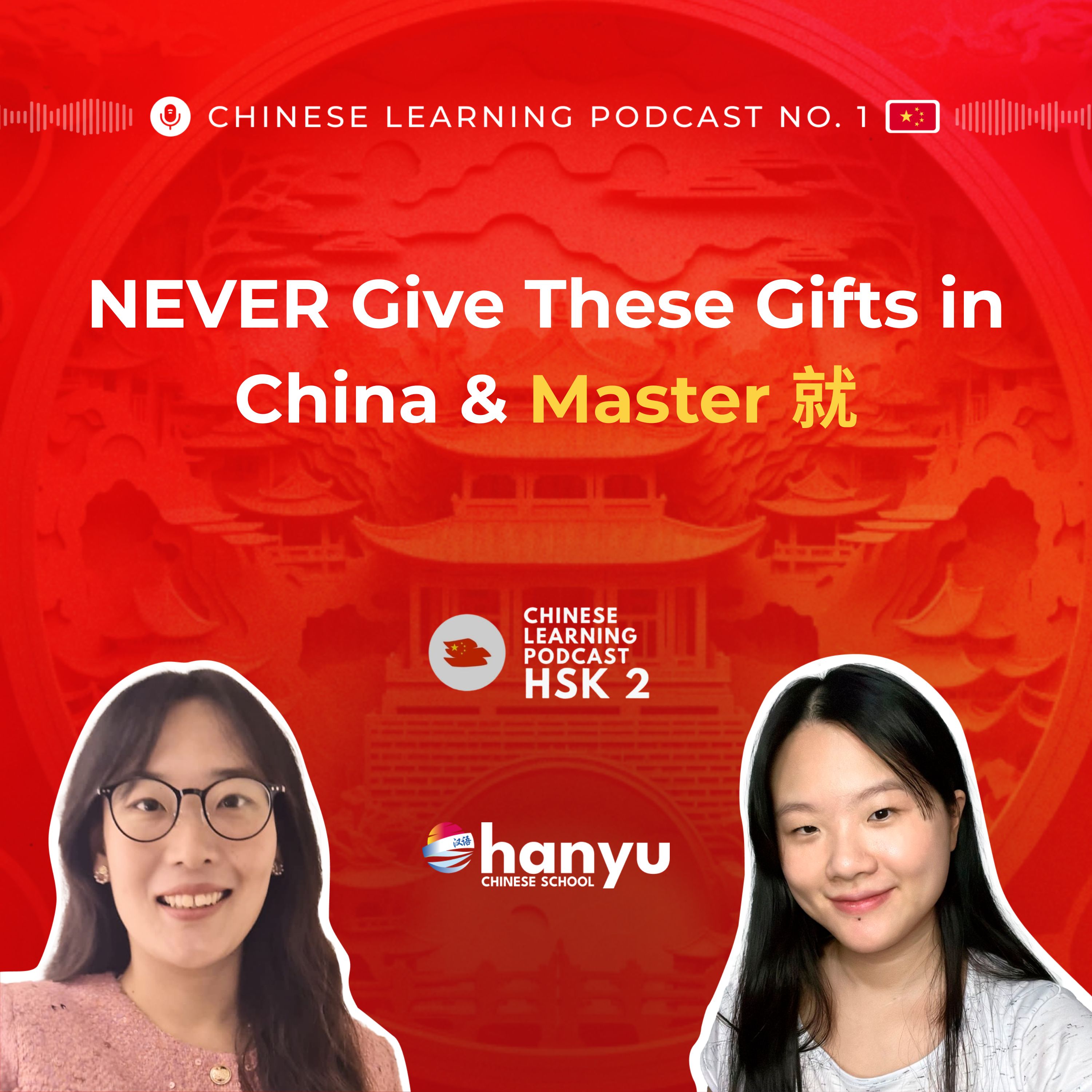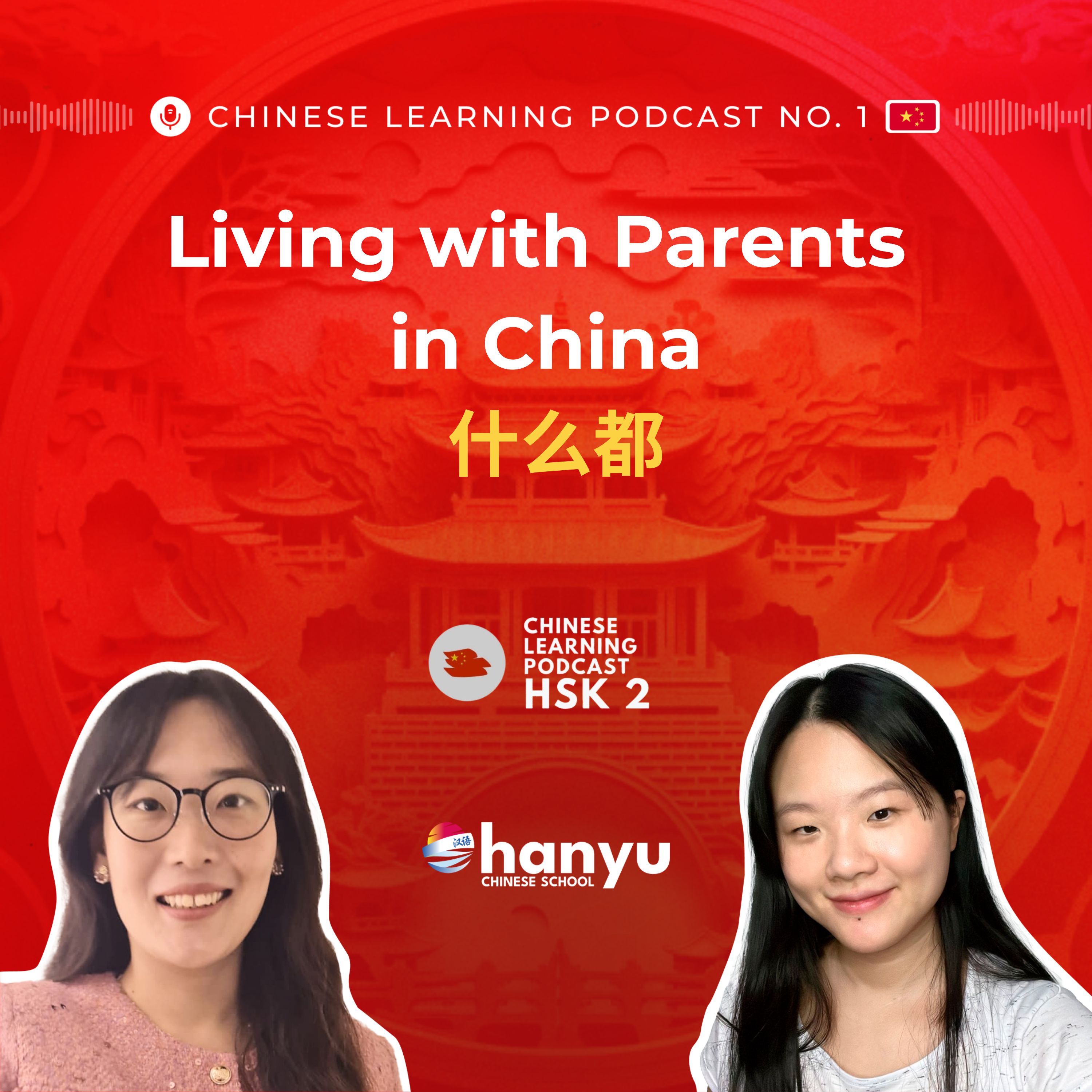Episode Transcript
[00:00:00] Speaker A: Foreign.
Hello. Hello.
[00:00:13] Speaker B: Hello, everyone.
Long time no see.
Welcome back to our Hanyu Chinese podcast. I'm your old friend Melanie and here today with our precious.
[00:01:18] Speaker A: Woman.
[00:01:26] Speaker B: How is the weather there?
Oh, how the hear the same.
[00:01:56] Speaker A: Okay, so we're gonna learn today.
Let's see.
So today we're gonna learn a grammar that I really like is to talk about time in different situations.
[00:02:13] Speaker B: Wow. So, so we will learn some when, blah, blah, blah, and sometimes and we'll show you how to use them naturally in conversations. And we are going to learn some Chinese, which is phrase phrases with Chinese and English mix. So Chinglish.
[00:02:37] Speaker A: Yeah. So let's dive in to see our conversation today.
Okay, so right before we start, if you are listening to our podcast, I hope you guys liked it.
If you want to learn your English and. Sorry, I'm so sorry. Not English, but we do teach English classes. I'm so sorry.
If you want to learn Chinese and take your skill to the next level, you're gonna love this episode.
If you'd like to learn with us, you can try a free one on one class through our PEP platform right down here. Www.hanyechinisechool.com.
so we have courses just starting from €39 with live classes, recorded classes, and a full access to our online camp. So you can learn on your own pace, whenever and however you would like it.
[00:03:34] Speaker B: Welcome Huan Ying Daja.
Okay, so we also will start with our dialogue as usual. So today's dialogue, the setting is Melanie and Emily are chatting at a cozy cafe about their work and coffee. Coffee habits.
[00:03:54] Speaker A: So, Melanie.
[00:05:12] Speaker B: Okay, let's take a deep look at the shi hou and.
And how to use them with verbs, subjects and nouns.
So which means when at the time of the structure is verb or action or noun. Plus the.
Plus the main clause.
[00:05:39] Speaker A: Very good. So remember, in English we put when in the front, but in Chinese, the it's always after the main time or main action that you want to. To talk about.
So for example, we have this example from dialogues. First one is so when I'm working, it's in the front.
So when I'm working, I like to drink tea. So it does not mean when I drink tea, I work, it's when I work, I like to drink tea. Okay, so let's take a look at the second one, the cafe.
So when I was little, I secretly drank my dad's coffee.
So in this case it's a little bit special, you can say, but it's also correct, which means when I was little.
[00:06:52] Speaker B: Okay, so here are Some extra examples. The first one.
So when class is in session, during class or while class is going on, don't play with your phone. So don't play with your phone when class is in session.
And I feel nervous during exams. Kao Shuda Shah during exams. And be careful, don't say plus the verb or the noun. We should put the shiho after the verb or the noun. The order is different from English.
[00:07:46] Speaker A: Very good. So then let's take a look at sometimes.
So let's take a look.
Okay. First, the structure. Melanie, could you help us with this please?
[00:08:01] Speaker B: Yes. The structure is subject plus plus verb plus object.
[00:08:08] Speaker A: Very good. And also sometimes we do see in front of the. In front of the subject, which is also okay or.
[00:08:21] Speaker B: Okay.
[00:08:21] Speaker A: So let's take a look at the examples.
[00:08:27] Speaker B: Okay, so the examples from the dialogue. First one, but sometimes I also drink coffee.
Sometimes.
Second, sometimes I feel sleepy. I want to sleep.
Very good.
[00:08:53] Speaker A: So let's take a look. Here are some extra examples.
Sometimes I go to the library to study on weekends.
Or sometimes our family goes together to a restaurant to eat Chinese food.
So you can see we can put the subject before or after both are correct.
[00:09:29] Speaker B: Okay, so we can also combine both and to describe occasional events during a specific time. For example, when I'm working, sometimes I drink coffee.
Sometimes I drink tea during class, sometimes I fall asleep. Oh, please don't do that.
[00:10:11] Speaker A: Yeah, that's not good.
That's not good.
Okay, let's take a look. Now we have some questions.
[00:10:21] Speaker B: Okay, so here, here's the question for you. So let's test your understanding of how would you say in Chinese, when I eat Chinese food, I use chopsticks.
[00:10:36] Speaker A: It's something really hard.
So think about sentence to structure, subject plus the, then the verb and leave your answer in the comment section down below and we can have a chat with you and then give a feedback.
[00:10:54] Speaker B: Have a try.
Okay, everyone, let's move back to our dialogue and review what we have learned of the grammar. So please pay attention to the Yoshi Hou and.
[00:11:10] Speaker A: Very good. Okay, so Melanie, Melanie, when you are working, do you like to drink tea or coffee?
[00:11:39] Speaker B: When I'm working, I like to drink tea, but sometimes I also drink coffee.
[00:11:58] Speaker A: Really? I can drink tea, but. But when I was little, I secretly drank my dad's coffee and it was too bitter, so I never drank it again.
[00:12:16] Speaker B: That's really funny. So you don't drink coffee anymore now?
[00:12:32] Speaker A: Sometimes I feel sleepy. When I feel sleepy and want a little. But once I think about the bitterness, can't do it at all.
[00:12:52] Speaker B: When I drink coffee, I like to add milk the most. It's really tasty. You should try it next time.
[00:13:03] Speaker A: I think I'll pass.
[00:13:11] Speaker B: Got it. Next time when we drink tea, I will prepare a cup for you too.
[00:13:19] Speaker A: Thank you so much.
[00:13:22] Speaker B: Okay, so did you notice how do we use the Shi Hou when blah blah, blah. And sometimes in the dialogue.
So are you enjoying this episode? With our classes, you can make even more progress. We're the top printed online academy with over 3,000 satisfied students. And we have an overall rating on Trustpilot 4.8 out of 5 based on over 200 reviews.
We offer classes starting from just €39, including group classes, recordings, and a 24.7learning platform.
And if you'd like to start step by step, try a free class and see for yourself. You can find everything at our website.
You can scan the QR code right here at this page or listen to all of our podcast episodes on our campus. We have our podcast on all kinds of platforms. Spotify, YouTube, Twitch, Apple Podcast, etc. If you want to know more, you can check on our website.
So campus.hanyuche school.com podcast or campus.tran lang.com podcast.
[00:14:45] Speaker A: Very nice.
Okay, let's take a look at a really interesting pro.
Real interesting topic.
So we're going to talk about Chinglish.
[00:15:06] Speaker B: Okay. So you know, Chinglish is everywhere in China. It's when Chinese and English mix, usually because of direct translations or grammar differences.
Some of it is really, really funny.
[00:15:21] Speaker A: Yes. So like the English phrase long time no see, it's actually something from Chinese, which means.
So it's something like. I think the Chinese people say so much right now. It's something that. I don't know, I think also foreigners also say as. As well.
So one day I remember I was talking to my. My student from Spain and he was really surprised that the phrase long time no see, it's actually from Chinese.
So yeah, it's a Chengyu that we use. So it's okay. So then we have actually the other one. It's no can do. No can do? Yeah, it's actually just means.
So it's another example that this is also something. It's literally from Chinese.
[00:16:24] Speaker B: Wow, that sounds a bit weird. But funny. So it's now it's not just in phrases. Science manuals. And the instructions are full of Chinglish. For example, you might say, you are welcome to visit our factory, Huany Gong Chao. When they really may tour our factory.
[00:16:52] Speaker A: Or like in the. In the toilets. No smoking in the toilet.
So it's perfectly understandable in Chinese, but it sounds a little bit strange in English, I would say.
[00:17:10] Speaker B: Yes, it is.
And warnings too, like slippery when wet. Well, what does that mean? Can appear as a. When wet, be careful of sleeping.
So animal science can even say, do not throw food to the animals, which is so literal and it's hilarious.
It actually means please do not feed the animals.
[00:17:45] Speaker A: Yeah, like. Like if you. If you throw food to the animals, it's actually also, of course, like, don't do that. Please do not do that as well. But I don't think anyone would throw foods at a cute little rabbit. Right.
So, yeah, also menus are full of Chinklish too. Like fried chicken with a twist, which actually means.
No. It might be confusing in the dining because they don't know what a twist is.
Or something like bitter lemon salad.
It's actually.
It's not accurate, but it can scare someone who isn't used to the bitter lemon.
[00:18:41] Speaker B: Wow. We really need a lot of imagination to understand that kind of Qinglish.
So the funny thing is, Czinglish isn't just mystics. It shows how languages interact and involve some phrases even make it into Western English. Like what we have talked about. Long time no see.
Or add oil. Cheer up.
[00:19:07] Speaker A: Oh, we have.
[00:19:08] Speaker B: Come on. Go, go.
[00:19:09] Speaker A: I did not know that one. Oh, God.
But if you. I don't know. In China, like, if you travel to Taiwan and you can take a look in the shorts or the T shirts or especially the notebooks, sometimes they have like, a phrase in. In English, but it sounds so weird. It really sounds so weird. It's like, it's. It's probably something like, to cheer you up to, like, being, like, encouraging. It should be a phrase of, like, encouragement. But it just sounds so weird. So, like, it's kind of like little spotlight. If you go travel to Taiwan, you can. You can try to find these kind of phrases.
[00:19:59] Speaker B: So we need. Sometimes we really need some sense of humor to understand, like, different culture and.
[00:20:05] Speaker A: Yeah.
[00:20:06] Speaker B: And the. Like, English.
[00:20:08] Speaker A: Yeah, exactly.
Okay, so let's take a look. Let's take a look at the question that we had earlier.
[00:20:18] Speaker B: So we. When I eat Chinese food, I use chopsticks. The correct Chinese sentence is, when I eat Chinese food, I use chopsticks.
[00:20:35] Speaker A: So great job if you got that right.
If not, you can always go back to see the book podcast to understand more of the grammar.
[00:20:48] Speaker B: Okay, now it's your turn. Please use the OR to make a sentence about something you do during the day.
[00:20:59] Speaker A: So, yeah, also leave a comment in the comment section down below of your sentence.
We will read them and give them a feedback.
[00:21:08] Speaker B: So please really welcome have a try.
[00:21:14] Speaker A: Okay, so thank you guys so much for staying with us till the end. If you truly want to learn Chinese with a real teacher and have a clear method, please Visit our website www.hannishanyschool.com and book your free class. We have a first free class for you to take a try to see it for yourself if you like it or not.
We have courses Starting from just €39, live classes, recorded classes and a complete platform to help you out. We have all kinds of exercise and vocabularies on the platform we have which is super useful and plus all of our podcasts are organized in the campus so you can track your progress. We have also the website campus.honeychim school.com podcast or campus.training.com podcast. It's right down here.
And so we hope to see you guys in class.
[00:22:20] Speaker B: Welcome to visit our website Hua Ying Baja so that's all for today. We learned how to use when, blah blah blah and sometimes. And we had a fun cultural segment on Czenglish.
[00:22:36] Speaker A: Yes. So don't forget to practice your sentence and check out our website for more resources.
[00:22:44] Speaker B: So next episode we'll learn another important grammar point.
How to talk about future actions in Chinese.
[00:22:55] Speaker A: Exactly. So can't wait to see you guys and see you guys next time next week.


